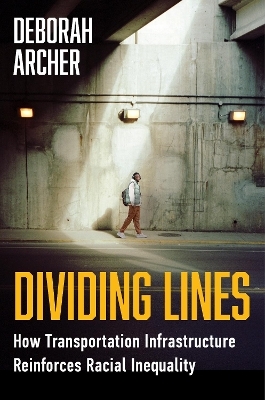
Dividing Lines
How Transportation Infrastructure Reinforces Racial Inequality
Seiten
2025
WW Norton & Co (Verlag)
978-1-324-09213-1 (ISBN)
WW Norton & Co (Verlag)
978-1-324-09213-1 (ISBN)
- Noch nicht erschienen (ca. April 2025)
- Versandkostenfrei innerhalb Deutschlands
- Auch auf Rechnung
- Verfügbarkeit in der Filiale vor Ort prüfen
- Artikel merken
From an eminent legal scholar, an eye-opening account of how our government perpetuated segregation and disadvantage after the fall of Jim Crow.
Our nation’s infrastructure is crumbling. From collapsing highways to pockmarked roads to unreliable subway systems, the need to rebuild is manifest. But as Deborah N. Archer warns in Dividing Lines, we must not repair our infrastructure without first coming to grips with the troubling history behind it. Archer shows that when government-sanctioned racism was finally deemed illegal after the successes of the Civil Rights movement in the 1960s, officials across the country turned to infrastructure to protect segregation. Highways could not be run through Black neighborhoods based on the race of their residents, but those neighborhoods’ lower property values—a legacy of racial exclusion—could justify their destruction. A new suburb could not be for “whites only,” but planners could refuse to extend sidewalks from Black communities into white ones. With immense authority, Archer uncovers the animus built into our everyday environments and explains why existing Civil Rights law is insufficient to address the challenges we face today.
Our nation’s infrastructure is crumbling. From collapsing highways to pockmarked roads to unreliable subway systems, the need to rebuild is manifest. But as Deborah N. Archer warns in Dividing Lines, we must not repair our infrastructure without first coming to grips with the troubling history behind it. Archer shows that when government-sanctioned racism was finally deemed illegal after the successes of the Civil Rights movement in the 1960s, officials across the country turned to infrastructure to protect segregation. Highways could not be run through Black neighborhoods based on the race of their residents, but those neighborhoods’ lower property values—a legacy of racial exclusion—could justify their destruction. A new suburb could not be for “whites only,” but planners could refuse to extend sidewalks from Black communities into white ones. With immense authority, Archer uncovers the animus built into our everyday environments and explains why existing Civil Rights law is insufficient to address the challenges we face today.
Deborah N. Archer is president of the ACLU, a tenured professor and associate dean at New York University School of Law, and the faculty director of the Community Equity Lab at NYU Law. She lives in New York.
| Erscheint lt. Verlag | 15.4.2025 |
|---|---|
| Zusatzinfo | 15 illustrations |
| Verlagsort | New York |
| Sprache | englisch |
| Maße | 152 x 229 mm |
| Themenwelt | Geisteswissenschaften ► Geschichte ► Regional- / Ländergeschichte |
| Recht / Steuern ► EU / Internationales Recht | |
| Recht / Steuern ► Öffentliches Recht ► Verfassungsrecht | |
| Sozialwissenschaften ► Soziologie | |
| ISBN-10 | 1-324-09213-0 / 1324092130 |
| ISBN-13 | 978-1-324-09213-1 / 9781324092131 |
| Zustand | Neuware |
| Haben Sie eine Frage zum Produkt? |
Mehr entdecken
aus dem Bereich
aus dem Bereich
Erinnerungen
Buch | Softcover (2024)
Pantheon (Verlag)
16,00 €


